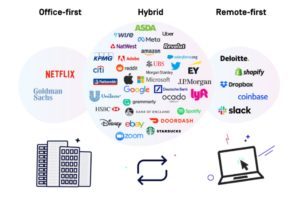Are we doing hybrid or not?
I have had a few discussions with clients and participants recently where the stated objective was to work on how the organization needs to adapt it’s leadership, collaboration and skills for a hybrid reality. However, it is still common to find that, even though the policies are announced enabling flexible work, a minority of leaders want to continue to debate whether it’s a good idea.
They raise concerns about collaboration, socialization and culture that we do need to work through (though all are solvable), but I think the stage for discussing whether we are doing it has passed and hybrid is now a reality we need to get on and manage.
Here is an image from a great blog from Hubble with a live list of well known companies’ hybrid policies. The message is clear – its hybrid.

In our work on matrix management we see similar resistance. In some instances a matrix has been in place for years, but people still want to debate whether it’s the right system – despite the fact that nearly all large complex organization operate some form of matrix. As these organizations have no intention of abandoning the matrix it is a pretty pointless discussion and leads nowhere.
Gartner expect that in about a third of the cases where companies implement hybrid working they will initially fail, largely because they didn’t adapt their ways of working to the new hybrid reality.
If we do want to make it work, we need at some point to stop constantly debating the question of whether we’re going to do it. For most of our clients the policy is already announced, it’s a done deal. Let’s take our energy and put it into the how rather than the whether.
I suspect there will always be a minority of managers who are uncomfortable with giving up control and trusting people to work remotely. Research on companies that introduced a matrix organisation found that it wasn’t unusual for about 10% of the management population to leave after the change. If you’re uncomfortable with having to exercise influence rather than power and with being accountable for results when you don’t have control over resources then the matrix can be a difficult place to be. Its the same with hybrid.
There may be some managers who would prefer to seek out those organisations who insist on having people back in the office full time, though we suspect this will be a small minority of companies and that this will be a career limiting preference.
For the rest of us, we also need to move on from the debate about how many days we spend in the office. This will evolve over time. Longer term an understanding of how, when and where to do work (where the office is just one location we use for particular types of work) is likely to be the solution.
Hybrid is now the way most of us will run our operations for the foreseeable future – let’s get on with making it work.

Explore our training programs to see how we can help.
Agile & Digital Training Matrix Management Training People and purpose Training Virtual Teams TrainingEducate yourself further with a few more or our online insights:
30 years of experience learning with a range of world class clients
We work with a wide range of clients from global multinationals to recent start-ups. Our audiences span all levels, from CEOs to operational teams around the world. Our tools and programs have been developed for diverse and demanding audiences.

Tailored training or off the shelf modules for your people development needs
We are deep content experts in remote, virtual and hybrid working, matrix management and agile & digital leadership. We are highly flexible in how we deliver our content and ideas. We can tailor content closely to your specific needs or deliver off the shelf bite sized modules based on our existing IP and 30 years of training experience.
For more about how we deliver our keynotes, workshops, live web seminars and online learning.